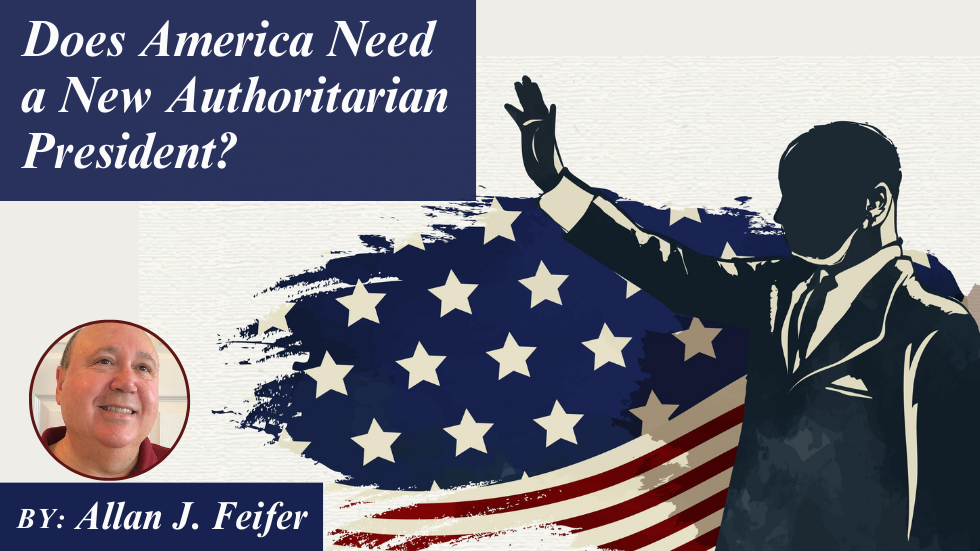Given the fears heard from the media about future Authoritarian leader, younger readers may be surprised, but we’ve already had several authoritarian Presidents throughout our history. President Roosevelt stands out as one of the best-known, revered by many, with Kennedy running a close second. Trump also was, and perhaps will be again, a strong authoritarian President. And don’t forget about Woodrow Wilson either, who very much fits that definition. Why are we afraid of the very word authoritarian? Let’s start with the dictionary definition and move on from there.
Definitions of Authoritarian:
Three definitions for authoritarian:
- Characterized by or favoring absolute obedience to authority, as against individual freedom.
- Tending to tell other people what to do in a peremptory or arrogant manner. synonym: dictatorial.
- Characteristic of an absolute ruler or absolute rule; having absolute sovereignty; — of governments or rulers.
The word Authoritarian has an unfortunate negative connotation. All three definitions above make those desiring safe spaces and consensus decision-making shake in their boots. Given that authoritarianism is not just a Republican or Democratic characteristic, let’s examine why most successful and incredibly transformative Presidents have had a strong authoritarian bent and why we may not want the leader of the free world to be overly touchy-feely.
Presidential Vision Conflicts:
It is important to note that the President’s vision occasionally conflicts with the more widely held views of the public or the political class. While the House and Senate, which you would ostensibly think are closest to the people, frequently or mostly reflect more narrow partisan interests, think in terms of bringing home the bacon. It is the President who sets the agenda, no one else. Eight years after Kennedy said we were going to the moon, it happened. Can you imagine if this was a collective endeavor of the House and Senate? We would have never gone.
Role of Authoritarian Leadership in the Time of Crisis:
Times of crisis are the most profound occasions demanding authoritarian leadership. As the United States entered the First World War, former president Theodore Roosevelt pleaded with then-president Woodrow Wilson to let him coordinate the American response. Roosevelt was bitterly disappointed when turned down, missing his chance to leave an enduring leadership legacy.
“If there is not the war, you don’t get the great general; if there is not a great occasion, you don’t get a great statesman,” he said. “If Lincoln had lived in a time of peace, no one would have known his name.”
Our Presidents are our leaders who deliver our future and solidify our past. Presidents innovate and lead; our House and Senate debate possible outcomes and frequently don’t reach a consensus. This can be a good thing, as a degree of tension was built into our system for many good reasons. One of the House and Senate’s roles is to either put brakes on Presidents or at least buffer overly ambitious ideas and actions. Our Presidents will continue to be the most likely to save the Republic and navigate us through the inevitable shoals of dangerous waters into the future. Milquetoast Presidents have not fared well in a historical context.
Authoritarianism – A Detailed Walkthrough
Authoritarianism is a new old buzzword. For a country that prides itself on Democracy, we sometimes have a problem understanding that definition. Does it mean that our leaders are to do the people’s bidding? Or does it simply mean that everyone gets a vote? Senator Mike Lee said,
“Democracy isn’t the objective; liberty, peace, and prosperity are. We want the human condition to flourish. Rank democracy (mob rule) can thwart that.”
Too few citizens even know we are a Republic and what that means. Could you pass a citizenship test? From The Hill:
“And for those under the age of 45, fewer than one in five, just 19 percent, passed the test.”
Our narcissistic citizenry lacks the vital interest and necessary investment of time to understand important issues. This is why we need strong Presidents with an equally strong Legislative Branch to keep a strong President in check. Citizens want the appropriate degree of balance in government commensurate to our times. We need more decisive Presidents in times of war and weaker ones when our necks are not in a noose.
This system has worked well for most of our last 250 years. However, something has changed that dramatically altered the balance of power…the rise of the bureaucracy. If you want to understand how powerful a bureaucracy can become, look no further than France. From a Frenchman:
“Of course, I realize that bureaucracy is inefficient and despised anywhere, but it does seem that there is a peculiarly French style of administration where everything depends on personal sympathy with the secretary/admin officer.”
America’s Bureaucracy: A Labyrinth of Inefficiency and Inconsistency
America’s bureaucracy has come of age. The French have nothing on us any longer. “Our agencies which perform vital functions, only exist to guarantee their survival. Do you need a timely passport, a wetlands determination, an oil exploration permit, or any of the tens of thousands of ‘permissions’ granted by State, Local, or Federal bureaucracies? Their interpretation of what is permissible is frequently inconsistent, slow, and inflexible. Too many of these people appear to lead anti-progress and anti-democratic movements. My dealings, as well as those of friends and associates over many years of business here and internationally, reinforce those beliefs.
We see big business and bureaucracy as closely allied in inefficiency. Our Navy can’t seem to build warships without huge cost overruns, and that takes two to three times as long as some of our allies to produce. Why are we falling behind our enemies? Blame what President Truman used to call the military-industrial complex.
Our next Authoritarian leader must rein in our soul-sucking bureaucracies and our military-industrial complex before they so weaken us that we will lose the next consequential war, be it one of trade, inventiveness, energy, or on the battlefield. The Framers never anticipated that the bureaucracy would become as powerful as it has. They never intended the Federal Government to grow boundless. We need an ultra-strong President to reset the bureaucratic clock for another 250 years. It won’t be easy; there are just too many snouts in the trough.
Extensive Analysis:
It’s in our nature to believe we’ve earned the money, power, and more that comes from working for the government. It’s our job to ensure we get value from our investment and not just a hindrance to America’s future. That job often falls to an authoritarian leader or Governor who might not be the respectful and polite statesman you think he ought to be.
God Bless America!
Allan J. Feifer—Patriot
Author, Businessman, and Thinker. Read more about Allan, his background, and his ideas to create a better tomorrow at www.1plus1equals2.com



Recent Comments